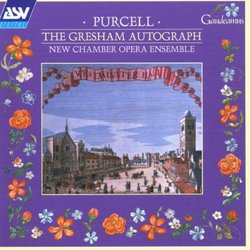| All Artists: Purcell, New Chamber Opera Ensemble Title: Purcell: Songs and Music from the Gresham Autograph Members Wishing: 0 Total Copies: 0 Label: ASV / Gaudeamus Release Date: 11/16/1999 Genres: Pop, Classical Styles: Vocal Pop, Opera & Classical Vocal, Historical Periods, Baroque (c.1600-1750), Sacred & Religious, Voluntaries Number of Discs: 1 SwapaCD Credits: 1 UPC: 743625019421 |
Search - Purcell, New Chamber Opera Ensemble :: Purcell: Songs and Music from the Gresham Autograph
 | Purcell, New Chamber Opera Ensemble Purcell: Songs and Music from the Gresham Autograph Genres: Pop, Classical
The Gresham Autograph is a manuscript in Purcell's own handwriting evidently prepared for giving recitals rather like the one on this disc. It's a collection of songs the composer extracted from larger works such as The F... more » |
Larger Image |
CD Details
Synopsis
Amazon.com
The Gresham Autograph is a manuscript in Purcell's own handwriting evidently prepared for giving recitals rather like the one on this disc. It's a collection of songs the composer extracted from larger works such as The Fairy Queen, the ode Hail, Bright Cecilia! and works in honor of Queen Mary, as well as some freestanding songs like the notorious "What can we poor females do?" All of the songs are arranged for one soloist, including many that were originally duets and trios. Purcell transposed a number of the works up for soprano from their original ranges--most notably "'Tis Nature's Voice" from Hail, Bright Cecilia!, originally for a countertenor (quite possibly Purcell himself). On this release, we hear three different sopranos, all stalwarts of London's baroque music scene: the assured Rachel Elliott, the gentle, sweet-voiced Libby Crabtree, and the vibrant Deborah York, whose rendition of "'Tis Nature's Voice" is a highlight. And there's an extra treat: several of Purcell's short pieces for keyboard played on a spinet (sort of a baby harpsichord) and a small 16th-century English organ with a distinctive timbre. The one piece of bad news: you'll have to listen through or around the recording to appreciate much of this. The combination of venue and recording quality tends to even out the nuances of volume in the singing (only the most obvious echo effects register), giving a nasal edge to the voices and exaggerating their (slight) vibrato somewhat. This is a well-performed program of some delightful Purcell songs. It's just unfortunate that the flat sound gets in the way. --Matthew Westphal

 Track Listings (30) - Disc #1
Track Listings (30) - Disc #1